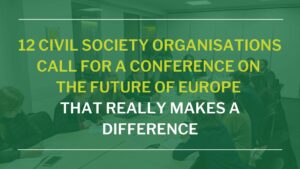
The COVID-19 crises proved more than ever both the need for an open debate on the Europe that we want, and the crucial role of digital democracy tools to make the Conference on the Future of Europe a reality.
Initiated precisely so to engage all stakeholders in a more structured debate, the Conference is an opportunity to improve the functioning of the European Union (EU) and its policies. It recently made its way back into news headlines, as on June 24th, the Council of the European Union came out with a position statement on its arrangements. Agreed during a meeting at the level of ambassadors, the Council calls for its launch to take place “as soon as the epidemiological conditions allow for it”.
From the beginning, the proposal for the Conference has been welcomed with different levels of enthusiasm from the EU institutions. But while working out the details, all have agreed on one thing – the value of citizens’ input into the process.
In its role as a bridge between citizens and the institutions, civil society has been the obvious choice through which this input can be communicated. However, as a citizen-centric organisation, ECAS believes citizens should also be provided with direct methods for expressing their ideas, including the use of information and communications technology (ICT).
Through a designated multilingual internet platform and crowdsourcing, EU citizens can effectively state their concerns and propose solutions to their identified challenges. Our expertise on digital democracy can testify to these methods’ ability to contribute to a more open, transparent and inclusive form of policy-making. As Elisa Lironi, ECAS Senior Manager European Democracy, noted in her article written for Carnegie Europe: “Many European countries have started exploring ICT’s potential to reach more citizens at a lower cost and to tap into the so-called wisdom of the crowd, as governments attempt to earn citizens’ trust and revitalize European democracy”.
To varying degrees, all three EU Institutions – Commission, Parliament and Council – have expressed commitment to implementing new forms of citizen participation into the Conference. EC Vice-President Maroš Šefčovič shared that they are working on a multilingual digital platform, which would give access to all related documents, live-streaming debates, outcomes, and other methods of interaction.
For broader involvement, online tools should be complimented with offline activities. Face-to-face consultations and public debates on a national level can complete the ‘vision’ of the type of European Union citizens want moving forward.
 The above views are also expressed in detail in a set of civil society organisations’ recommendations for a successful Conference on the Future of Europe, to which ECAS contributed. The statement can be viewed here.
The above views are also expressed in detail in a set of civil society organisations’ recommendations for a successful Conference on the Future of Europe, to which ECAS contributed. The statement can be viewed here.